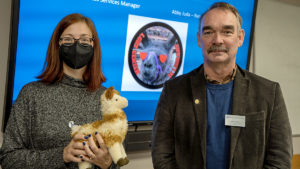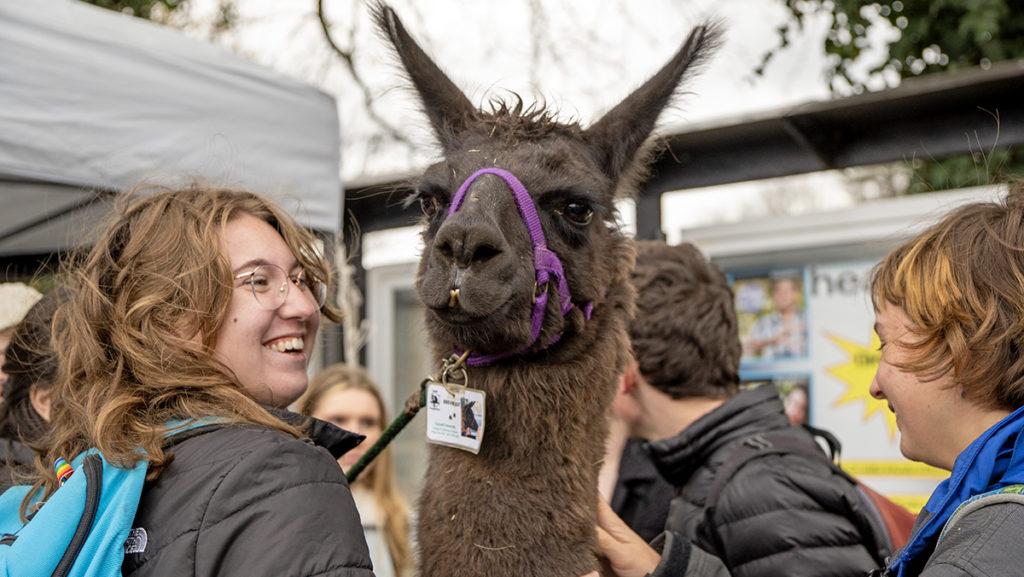To increase awareness about the benefits of animal assisted activities (AAA), Ithaca College Library staff — organizers for student de-stress events — hosted an event Nov. 15.
During the event in the Cayuga Lake room in Campus Center, about 17 attendees and library staff spoke about how multiple groups on campus are involved in creating opportunities for AAA and asked students for feedback and opinions on de-stress events. The college has been providing students with AAA organized by the library since 2014. The Center for LGBT Education, Outreach and Services has co-organized AAA since Spring 2019.
Research suggests that AAA is effective in reducing depression, anxiety and stress levels. Other studies have found that people have favorable views on AAA and believe that it significantly helps mental health. During the COVID-19 pandemic, therapy dog adoption increased significantly, and overall, 71% of pet owners believe their pets help them with their mental and physical health.
First-year student Malaika Menezes said animals have helped her through difficult times in her life.
“When I was nine, I was hospitalized for about two months because of an accident and during that time they had therapy dogs come into the hospital and it helped so much, it was perfect,” Menezes said. “You know, you sit in a room all day. You are anxious, you are in pain, and seeing dogs [helped]; they are so carefree.”
Bernard Hogben ’05, access services manager for the library, said he knows how stressed students at the college can get, especially when exams are coming up. He said the purpose of AAA is to provide students with comfort during a period of the semester where they may feel drained.
“We want to make sure the de-stress events are successful,” Hogben said. “I understand the end of the semester stress. I understand it is nice to have a little break away from the semester, even for one hour.”
Hogben said a great deal of planning goes into bringing animals on campus for students. He said multiple groups at the college are involved in making sure AAA is successful, including the Office of Public Safety and Emergency Management, which is in charge of transporting the animals, and the Office of Facilities, which is in charge of providing shelter in case of rain or snow. He said these different departments come together to ensure students do not miss out on something they have tended to enjoy before finals week.

Leila Marcillo-Gomez/The Ithacan
“We put this on Facebook, Twitter and Instagram and respond to comments such as, ‘Is this what my tuition dollars are going toward?’ And we answer, ‘No, these are volunteers,’” Hogben said.
AAA is particularly helpful for college students, as a large majority of college students nationwide report being stressed. Many colleges have responded with AAA and there have been over 900 animal visitation programs on campuses nationwide.
Senior Ephraim Graham said that he has seen the animals on campus and that most people enjoy it. He also said he thinks diversifying the types of animals — which are usually dogs — is a good idea. For example, one of the most popular animals that is brought to campus for students to interact with is a llama named Late for Breakfast, who is part of the Cornell Companions program. In the past, puppies have been brought to the library, and according to Menezes, The Center for LGBT Education, Outreach and Services has had a cat for students to interact with. Graham acknowledged the value of animals as strong support systems for people.
“I see a lot of people who have mental [health] problems who, with their dogs, seem to be a lot more calm,” Graham said. “I know a lot of people who rely on their dogs, so if their dog is gone they do not really have another support system.”
Science Librarian Abby Juda said that in the past, emoji stickers have been used to gather information on whether or not interacting with the animals helped students. Students were asked to place an emoji sticker that corresponded with how they were feeling before and after interactions with the animals on a poster board outside of the Gannett Center. Juda said that while this approach worked as it was something fun for students to do while they waited, organizers of AAA are going to try something slightly new, where students will scan a QR code on their phone and tap on an emoji which corresponds to how they are feeling.
“We are hoping to use that information to make data-driven decisions about the llama,” Juda said. “If you all came and felt super sad afterward, then we will know something about the llama is not working the way we want it to, so we are going to go back to the drawing board and figure it out. By the same token, if everyone is happy, then we will know it is working and we can think about having other events like this and expand our de-stress events in general. … We want to make a case that these make people happy.”
Since Fall 2021, the college has held a Stop and Breathe Week at the end of every semester to help alleviate stress students may have before finals by organizing different de-stress events. According to previous reporting from The Ithacan, AAA has been a popular way to participate in these de-stress activities.
Menezes said that although she has alternative methods of stress relief for herself, animal companionship is unique.
“I usually turn to reading or writing or something creative, but I feel like animals can kind of get you out of your head a little more than that, because it is having someone that you can spend time with,” Menezes said.








